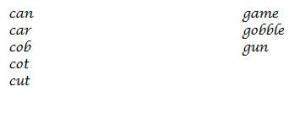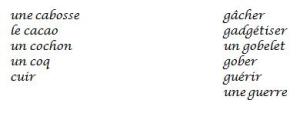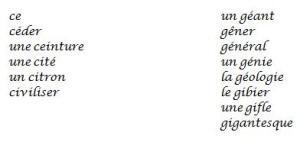Tag Archives: language
What’s a kinnamon?
I’ve talked a lot about patterns this week, and guess what? I’m not done. Take a look at these groups of English words:
 Do you see any patterns? Look again. “C” and “g” – how are they pronounced and why are they pronounced that way?
Do you see any patterns? Look again. “C” and “g” – how are they pronounced and why are they pronounced that way?
Now look at these English words:
 What is the difference between this group and the first group? Come up with a rule and write it down. Seriously – don’t look online, don’t ask someone else, don’t scroll to the rest of the post until you have a rule.
What is the difference between this group and the first group? Come up with a rule and write it down. Seriously – don’t look online, don’t ask someone else, don’t scroll to the rest of the post until you have a rule.
…
…
…
Now I’ve got some clumps of French words for you. How do you think each of these sets of words is pronounced?
 This is a rare instance where French and English have the same rule. (Of course, there are plenty of exceptions to this rule, but it’s helpful nonetheless.)
This is a rare instance where French and English have the same rule. (Of course, there are plenty of exceptions to this rule, but it’s helpful nonetheless.)
Last chance! If you don’t have your own rule – come up with it now! The answer follows…
* * *
When ‘c’ or ‘g’ are followed by ‘a’, ‘o’, or ‘u’ they are hard. When they are followed by “e” or “i" they are soft.
* * *
Okay, now remember how we conjugate –ER verbs? What will happen when we conjugate "manger" – "to eat"? If we follow the rules for ER verbs without making any changes then the "nous" form will be "mangons". According to our new pronunciation rules, how will this word be pronounced? Does that sound good?
Nope.
This is fixed by simply adding an "e". "Nous mangeons."
Je mange Nous mangeons
Tu manges Vous mangez
Il mange Elles mangent
Any regular –er verb with a 'g' at the end of the stem will follow this rule in the present tense (e.g.: nager = to swim, nous nageons.)
Commencer (to start) has the same problem, but it is not solved by adding an 'e'. Instead of adding an 'e', simply add une cedille. You've seen them plenty of times (ça, français).
Je commence Nous commençons
Tu commences Vous commencez
Il commence Ils commencent
Every regular -er verb with a stem that ends in "c" will work this way in the present tense (e.g. placer = to place, nous plaçons.)
What did I tell you? It's all about the patterns.
(Frustrated when you need to type a letter with an accent? To type a c with une cedille in Word, just hold down the Ctrl key while you hit the ' , ' key and then type ' c '. It will appear with the accent. Voilà !)

